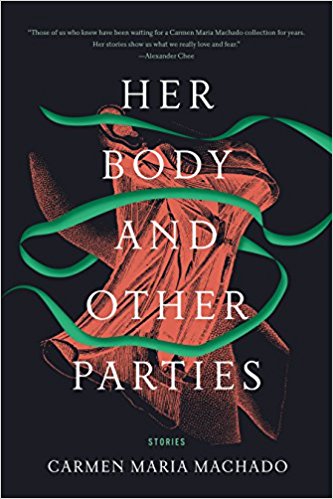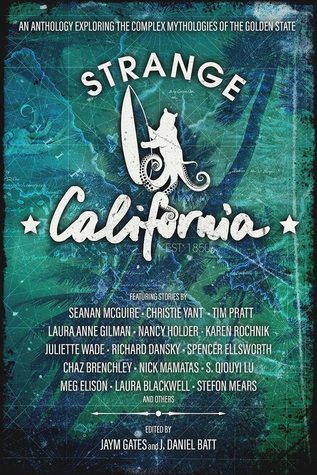Carmen Maria Machado’s Her Body and Other Parties (reviewed by Penny Reeve)

Carmen Maria Machado’s writing has — very rightly so — been receiving a lot of attention recently. Readers have been champing at the bit for more of Machado’s work since she set the literary world alight in 2014 with the incredible short “The Husband Stitch” and now we’re rewarded with a collection of her short stories with Her Body and Other Parties, which I’m already slating as one of my top reads of 2017. Machado has some serious literary strings to her bow, having written for NPR, Electric Literature, VICE and the New Yorker. Her short stories have appeared numerous anthologies including Best American Science Fiction and Fantasy and Best Woman’s Erotica. The new collection, featuring the aforementioned “The Husband Stitch” — which was nominated for both the Shirley Jackson and Nebula awards, as well as being longlisted for the James Tiptree Jr. and winning a Pushcart Prize special mention — has received praise from just about everyone, including author du jour Roxane Gay, LA Times and Kirkus, which shortlisted Her Body and Other Parties for their annual titular prize, despite it only being published October 3.
Book Review: Strange California (anthology)

California is a big state, and occupies an even bigger place in our imaginations, so it’s only to be expected that a collection of stories exploring what makes it so special — so strange — makes for a big book. Which is to say, a promise of value, of bang for one’s buck, is made right up front. As is outlined in what amounts to a manifesto in the book’s introduction, the stories in Strange California explore not only the state’s varied physical and cultural geography, but also what makes it so very different from the rest of the United States — what makes it strange. As editors Jaym Gates and Daniel Batt emphasize in the introduction, however, this collection is not merely an anthology of weird fiction. California is certainly weird, but it’s also strange — set apart, unknown, perhaps unknowable to those of us who don’t live there, who are strangers to the place.
Around the Podosphere #13: Podcasts of Note for June 24
It’s been a long time since I’ve posted one of these. Since the Skiffy and Fanty crew collectively listen to more podcasts than there are episodes of our show (totally scientific, promise), it’s about time we brought the Around the Podosphere back to share some of the goodness worming its way into our ears. So, here goes:
Short and Sublime: April 2015 Round-Up
April stories include historical fantasies, fairy tales, near futures, and one space fantasy tale. “Wild Things Got To Go Free” (Beneath Ceaseless Skies #170) by Heather Clitheroe works because of, and is refreshing due to, its spare worldbuilding. Soldiers are rounding up and hunting down certain civilians, who are turning into, or have the potential to turn into, other creatures — which includes the young protagonist and her mother. The two young women in “The Ways of Walls and Words” (Tor.com) by Sabrina Vourvoulias are similarly threatened by the yoke of the real world Spanish empire; though they, and their ways of life, couldn’t be more different. It’s a story about friendship, Nahuatl magic, and the power behind language.
Short and Sublime: March 2015 Round-Up
March has been a month of unusual settings, stories of alienation and loss, and meditations on the nature of time. Tade Thompson’s “The Monkey House” (Omenana #2), dystopian horror, is a story about what it means to be trapped inside a system, and the horrors one must overlook to be a part of that system; what happens when the ability to ignore horrors both natural and fantastical is seized from you and you alone? The protagonist is an unreliable narrator — or is he far more reliable as a narrator than the characters that surround him? — and holds a banal job as a paper-pusher with an insidiously creepy company whose purpose is obscured. This dystopia is set not in the future but in the eighties and follows the Orwellian tradition while being rather Kafkaesque, but adds enough facets, from dark fantasy elements to the chronic illness of the protagonist, to create something entirely new.
Mining the Genre Asteroid: Jirel of Joiry

Mining the Genre Asteroid is Paul Weimer’s look at the history of the science fiction and fantasy field, bringing to light important, interesting and entertaining books from science fiction and fantasy’s past to you. France during the dark ages. The ruler of a feudal holding stands to protect the people and realm against usurpers and rivals, wizards and witches, dark crossovers from eldritch dimensions and haunted castles. Possessed of indomitable will, a strong emotional core that erupts in violent love and hatred, and not inconsiderable skill with sword and the leading of men into battle, this feudal lord is the central character of six early sword and sorcery stories. Meet the lady Jirel of Joiry.

